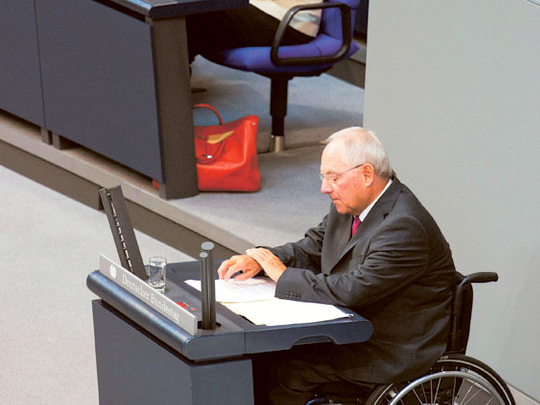
Berlin: German Finance Minister Wolfgang Schaeuble hit back on Tuesday at critics of austerity in Europe, saying economic growth cannot be boosted by easing the bloc’s budget rules or cutting interest rates.
“One can’t simply buy jobs and growth with public money,” Schaeuble told the lower house of German parliament, or Bundestag, in a budget debate.
His remarks may be seen as a reply to critics who blame Germany for imposing austerity on countries with big budget deficits. Such criticism has been strong in France recently.
Countries must get their finances in order by pressing ahead with structural reform, even if such measures are unpopular, Schaeuble continued.
Believing that simply easing the EU’s strict budget rules was a way to stimulate growth, was “a mistake”, he said.
“We’re not going to go down that path,” Schaeuble told the lower house of German parliament, or Bundestag, in a preliminary hearing on the government’s 2015 budget.
Neither could politicians shift the responsibility to the European Central Bank, the minister argued.
The European Central Bank “is doing what it can, but as you can see it is not in a position to force growth,” he said.
Last week, the ECB cut its key interest rates to new historic lows in a surprise move, and unveiled plans for asset purchases, in a bid to prevent the single currency region from slipping into deflation.
While the economy was flush with liquidity, businesses were still finding it difficult to find access to credit and that was a structural problem, Schaeuble said.
“Over the past few years, we’ve proven time and again — and we must constantly remind ourselves of that — that solid fiscal policy is the best policy for growth and jobs,” Schaeuble said.
“Budgets without new debt must become the norm from 2015,” the minister continued. “That’s the promise we’ve made and it’s promise we’ll deliver on.”
Schaeuble insisted that “this isn’t an end in itself. But it’s a sign of reliability. It’s the only way we’ll be able to safeguard confidence. Reliability is elementary for both investors and consumers,” Schaeuble said.
France in focus
Germany has come under attack from many of its European neighbours for insisting that countries bring down their public deficits. Critics argue that austerity is harmful to growth and jobs.
France, where there is hostility to the EU’s limits on budget deficits, has already indicated that it will again struggle to meet the EU’s strict requirements.
The French government has just been restructured after former Economy Minister Arnaud Montebourg attacked policies for budget rigour by the EU Commission, the ECB and Germany.
Montebourg was sacked for his latest remarks, but the crisis widened a split on the left of French politics.
Schaeuble said, referring to reliability and stability, sai: “That is keeping our promises. It involves sticking to the rules. Everyone must stick to the rules, which we’ve drawn up together.”
At the same time, Schaeuble said he and his French counterpart, Michel Sapin, were examining “joint propositions for creasing better investment conditions, both at a national and European level.”
The two ministers would present their proposals to a summit in Milan on Saturday, he said.











